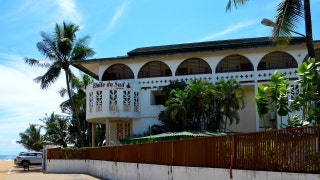Quiet rooms for children on the autism spectrum are popping up at airports.
Shannon Airport, which serves the southwestern region of Ireland, opened a "sensory room" for children and adults with neurodevelopmental challenges, including autism, on March 29. The room is located off the airport's departure lounge. It's designed to be a soothing place, with features like a wavy wall and color-changing lights. The official opening of the room came ahead of World Autism Day on April 2.
On this side of the Atlantic, there are quiet rooms at airports in Myrtle Beach, South Carolina, and in Atlanta.
Delta opened a multisensory room at Hartsfield-Jackson Atlanta International Airport in April 2016 in partnership with The Arc, an autism advocacy group. The room, located in a quiet space on F Concourse, contains a mini-ball pit, bubbling water sculpture, a tactile activity panel and other calming features.
The quiet room at the Myrtle Beach airport also opened in April 2016. It came about after a local mom, Becky Large, approached airport administrators about providing "some sort of support for families."
"We came up with a quiet room at baggage claim, which has worked out wonderfully," said Large, who runs a group called Champion Autism Network and has two children, one of whom has Asperger's. A caregiver can stay with a child in the room while someone else "retrieves bags and rental cars. There are cubbies and seating and a glass door so the child can be cordoned off and can't run away. It gives them a place to decompress."
London Heathrow opened a quiet room in 2013 as part of a family lounge in Terminal 3. Though it's mainly for children, it's not necessarily for those with autism. It's open to any family that would like to use it.
Some airports and airlines also offer families with travelers on the spectrum opportunities to become familiar with airport experiences that may be stressful. Harrisburg International Airport in Pennsylvania, for example, offers a "Wings for All" program that allows children with autism and sensory processing disorder to experience a run-through of what it's like getting on a plane, getting ticketed and getting seated so that they'll know what to expect when it's time for a real trip. A similar program took place at Myrtle Beach earlier this year, and Shannon launched a customer care program last year, providing special caps and wristbands for travelers with autism and other special needs so staff can identify them and interact appropriately.
"Going through security even for those without autism can be challenging," said Michael Schiferl of Chicago, whose daughter is on the spectrum, but it's even more challenging for kids who are easily overwhelmed by beeping machines, taking off shoes and crowds. He said TSA workers have been "very helpful" when told of his daughter's special needs.
Large also had her hometown, Surfside Beach, which is near Myrtle Beach, declared an "autism-friendly destination" last year, after restaurants, hotels, parks and other venues participated in training on how to interact with children with autism. For example, she said, they may "become overstimulated by light, sounds, smells, crowds," so a restaurant might seat their family in a "low-traffic area away from the kitchen."
Large said a bigger goal is to increase understanding at all levels for special-needs children who may exhibit unusual or awkward behavior.
"Many times when we leave the house with our kids, people look at you like you're a horrible parent," she said. "It results in a lot of judgment. Many people stay home. Our mission is to have them come out and play with us."








































